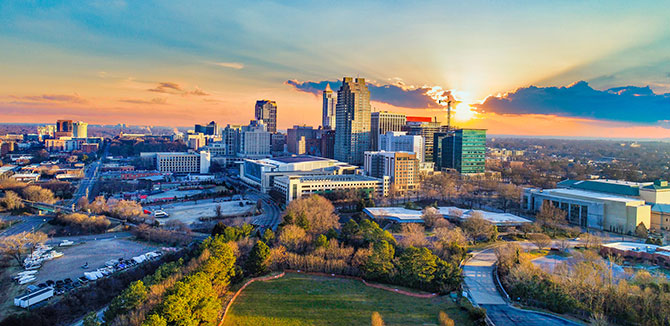A Common Tie Between Philadelphia and The Research Triangle
Central North Carolina and Philadelphia are separated by 400 miles, but both are hubs for biotechnology.
Philadelphia is known as the birthplace of the United States. It's where the Declaration of Independence and Constitution were both signed, and it's home to Independence Hall and the Liberty Bell, two of the most iconic symbols of American history.
Approximately 400 miles south of Pennsylvania's largest city is North Carolina's Research Triangle. The area in central North Carolina is not as historic as Philadelphia, but there are similarities. For students in Northwestern Engineering's Master of Biotechnology Program (MBP), the most notable commonality is that both are considered hubs for biotechnology.
Genetic Engineering & Biotechnology News ranked Philadelphia as the seventh largest biopharma cluster in the country, while the Research Triangle — a collection of nine counties that features Raleigh as its biggest city — was ranked ninth largest in the country.
MBP is highlighting a collection of the biggest bioclusters in the country to understand what makes each a hotbed for biotech and what differentiates each city from anywhere else in the country.
Christi McDowell-Patterson, head of process engineering and operation at Philadelphia-based Spark Therapeutics and member of the MBP Industrial Advisory Board, said it's no surprise Philadelphia is considered a top biotech destination.
"Philadelphia is rapidly becoming a hub for cell and gene therapy," McDowell-Patterson said. "It's a city that is rapidly growing with several emerging and expanding biopharma companies."
While many people know of Philadelphia as "The City of Brotherly Love," the city's intense focus on cell and gene therapy has led some to start calling it "Cellicon Valley." As of 2020, there were 36 different companies in the greater Philadelphia area focused specifically on cell and gene therapy.
Philadelphia has more than 23 million square feet of lab space, fifth most of any of the bioclusters in Genetic Engineering & Biotechnology News' ranking.
The Research Triangle has half as much available lab space but ranks fifth in funding from the National Institutes of Health (NIH), thanks in large part to its collection of acclaimed universities. The Research Triangle is home to Duke University, the University of North Carolina at Chapel Hill, and North Carolina State University in Raleigh.
The Research Triangle features more than 7,000 companies, and in its center is Research Triangle Park, home to more than 300 companies — one-third of which focus on biotechnology or life sciences.
"While the total number of biotech companies is remarkable in the Research Triangle," said Wulin Jiang (MBP '15), who got his PhD in Pharmaceutics and Drug Design from UNC, "the type of research also varies wildly from small molecular drugs, protein engineering, and genetic editing to cell therapy, adeno-associated virus therapy, and nanoparticle-mediated drug delivery."
The area was also named the second-best place to live in the country by U.S. News & World Report.
"I live a mile-and-a-half from downtown Raleigh," said James Bolling (MBP '13), an associate director at Precision Biosciences, "but I live in a house that was affordable to purchase and has plenty of space. It's not a cramped condo like I'd get in Boston or New York or San Francisco."
Hear from other MBP alumni about living and working in some of the country's other top bioclusters.


